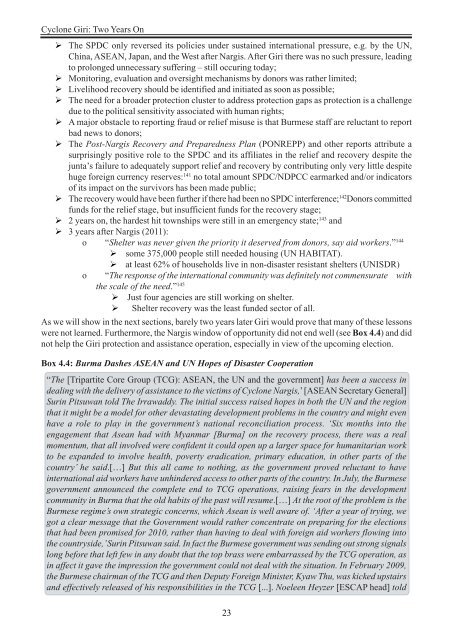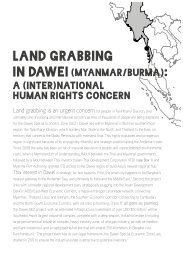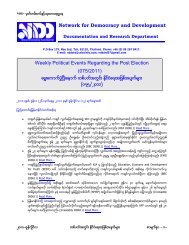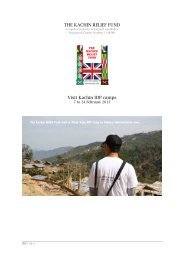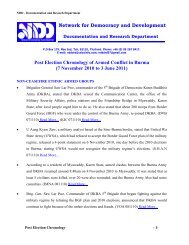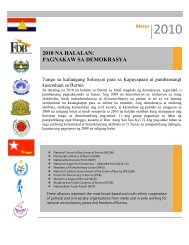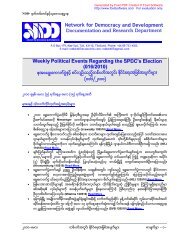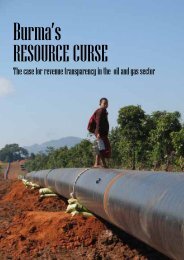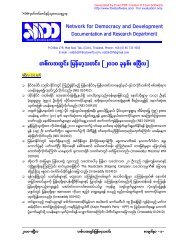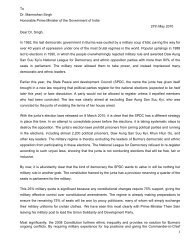Cyclone Giri - Two Years On - Burma Action Ireland
Cyclone Giri - Two Years On - Burma Action Ireland
Cyclone Giri - Two Years On - Burma Action Ireland
You also want an ePaper? Increase the reach of your titles
YUMPU automatically turns print PDFs into web optimized ePapers that Google loves.
<strong>Cyclone</strong> <strong>Giri</strong>: <strong>Two</strong> <strong>Years</strong> <strong>On</strong><br />
The SPDC only reversed its policies under sustained international pressure, e.g. by the UN,<br />
China, ASEAN, Japan, and the West after Nargis. After <strong>Giri</strong> there was no such pressure, leading<br />
to prolonged unnecessary suffering – still occuring today;<br />
Monitoring, evaluation and oversight mechanisms by donors was rather limited;<br />
Livelihood recovery should be identified and initiated as soon as possible;<br />
The need for a broader protection cluster to address protection gaps as protection is a challenge<br />
due to the political sensitivity associated with human rights;<br />
A major obstacle to reporting fraud or relief misuse is that Burmese staff are reluctant to report<br />
bad news to donors;<br />
The Post-Nargis Recovery and Preparedness Plan (PONREPP) and other reports attribute a<br />
surprisingly positive role to the SPDC and its affiliates in the relief and recovery despite the<br />
junta’s failure to adequately support relief and recovery by contributing only very little despite<br />
huge foreign currency reserves: 141 no total amount SPDC/NDPCC earmarked and/or indicators<br />
of its impact on the survivors has been made public;<br />
The recovery would have been further if there had been no SPDC interference; 142 Donors committed<br />
funds for the relief stage, but insufficient funds for the recovery stage;<br />
2 years on, the hardest hit townships were still in an emergency state; 143 and<br />
3 years after Nargis (2011):<br />
o “Shelter was never given the priority it deserved from donors, say aid workers.” 144<br />
some 375,000 people still needed housing (UN HABITAT).<br />
at least 62% of households live in non-disaster resistant shelters (UNISDR)<br />
o<br />
“The response of the international community was definitely not commensurate with<br />
the scale of the need.” 145<br />
Just four agencies are still working on shelter.<br />
Shelter recovery was the least funded sector of all.<br />
As we will show in the next sections, barely two years later <strong>Giri</strong> would prove that many of these lessons<br />
were not learned. Furthermore, the Nargis window of opportunity did not end well (see Box 4.4) and did<br />
not help the <strong>Giri</strong> protection and assistance operation, especially in view of the upcoming election.<br />
Box 4.4: <strong>Burma</strong> Dashes ASEAN and UN Hopes of Disaster Cooperation<br />
“The [Tripartite Core Group (TCG): ASEAN, the UN and the government] has been a success in<br />
dealing with the delivery of assistance to the victims of <strong>Cyclone</strong> Nargis,’ [ASEAN Secretary General]<br />
Surin Pitsuwan told The Irrawaddy. The initial success raised hopes in both the UN and the region<br />
that it might be a model for other devastating development problems in the country and might even<br />
have a role to play in the government’s national reconciliation process. ‘Six months into the<br />
engagement that Asean had with Myanmar [<strong>Burma</strong>] on the recovery process, there was a real<br />
momentum, that all involved were confident it could open up a larger space for humanitarian work<br />
to be expanded to involve health, poverty eradication, primary education, in other parts of the<br />
country’ he said.[…] But this all came to nothing, as the government proved reluctant to have<br />
international aid workers have unhindered access to other parts of the country. In July, the Burmese<br />
government announced the complete end to TCG operations, raising fears in the development<br />
community in <strong>Burma</strong> that the old habits of the past will resume.[…] At the root of the problem is the<br />
Burmese regime’s own strategic concerns, which Asean is well aware of. ‘After a year of trying, we<br />
got a clear message that the Government would rather concentrate on preparing for the elections<br />
that had been promised for 2010, rather than having to deal with foreign aid workers flowing into<br />
the countryside,’ Surin Pitsuwan said. In fact the Burmese government was sending out strong signals<br />
long before that left few in any doubt that the top brass were embarrassed by the TCG operation, as<br />
in affect it gave the impression the government could not deal with the situation. In February 2009,<br />
the Burmese chairman of the TCG and then Deputy Foreign Minister, Kyaw Thu, was kicked upstairs<br />
and effectively released of his responsibilities in the TCG [...]. Noeleen Heyzer [ESCAP head] told<br />
23


